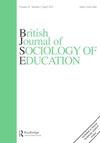空虚的英国?英国教育政策的霸权主义与模糊性
IF 2.1
3区 教育学
Q1 EDUCATION & EDUCATIONAL RESEARCH
引用次数: 0
摘要
摘要面对21世纪对暴力的“种族化”描述,学校在培养英国共同身份感方面的作用已成为焦点。在本文中,我们认为,某些英国教育政策文件可以被理解为霸权干预,旨在解决围绕英国身份建构的歧义。我们通过审查教育部(DfE)的“英国基本价值观”(FBV)指南及其与预防责任反恐计划的关系,以及教育部2022年发布的“学校政治公正性”指南来做到这一点。本文运用批判性话语分析(CDA),将Laclau和Mouffe(2014/1985)的霸权概念与Hall(2021/2000)的“英国性”是一个空洞的能指相结合,认为“英国性的模糊性为权力的行使和巩固提供了许多机会。最后,我们探讨了在学校现有职责范围内“课程非殖民化”要求的可能含义,并提出了上述职责对这些要求的可能结构限制。本文章由计算机程序翻译,如有差异,请以英文原文为准。
Empty Britain? Hegemony and ambiguity in British education policy
Abstract The role of schools in developing a sense of common British identity has taken centre stage in the face of ‘racialised’ accounts of violence during the twenty first century. In this paper, we argue that certain British education policy documents can be understood as hegemonic interventions seeking to resolve ambiguities surrounding constructions of British identity. We do so by examining the Department for Education (DfE) ‘Fundamental British Values’ (FBV) guidance within the context of its relationship to the Prevent Duty anti-terrorism programme as well as the ‘Political impartiality in schools’ guidance released by the DfE in 2022. Utilising Critical Discourse Analysis (CDA) and applying Laclau and Mouffe (2014/1985) conception of hegemony with Hall’s (2021/2000) claim that ‘Britishness’ is an empty signifier, this paper argues that the ambiguities of ‘Britishness’ present a number of opportunities for power to be exercised and consolidated. Finally, we explore the possible implications for demands to ‘decolonise the curriculum’ within schools’ existing duties and propose possible structural limits placed upon these demands by said duties.
求助全文
通过发布文献求助,成功后即可免费获取论文全文。
去求助
来源期刊
CiteScore
3.70
自引率
9.50%
发文量
74
期刊介绍:
British Journal of Sociology of Education is one of the most renowned international scholarly journals in the field. The journal publishes high quality original, theoretically informed analyses of the relationship between education and society, and has an outstanding record of addressing major global debates about the social significance and impact of educational policy, provision, processes and practice in many countries around the world. The journal engages with a diverse range of contemporary and emergent social theories along with a wide range of methodological approaches. Articles investigate the discursive politics of education, social stratification and mobility, the social dimensions of all aspects of pedagogy and the curriculum, and the experiences of all those involved, from the most privileged to the most disadvantaged. The vitality of the journal is sustained by its commitment to offer independent, critical evaluations of the ways in which education interfaces with local, national, regional and global developments, contexts and agendas in all phases of formal and informal education. Contributions are expected to take into account the wide international readership of British Journal of Sociology of Education, and exhibit knowledge of previously published articles in the field. Submissions should be well located within sociological theory, and should not only be rigorous and reflexive methodologically, but also offer original insights to educational problems and or perspectives.

 求助内容:
求助内容: 应助结果提醒方式:
应助结果提醒方式:


